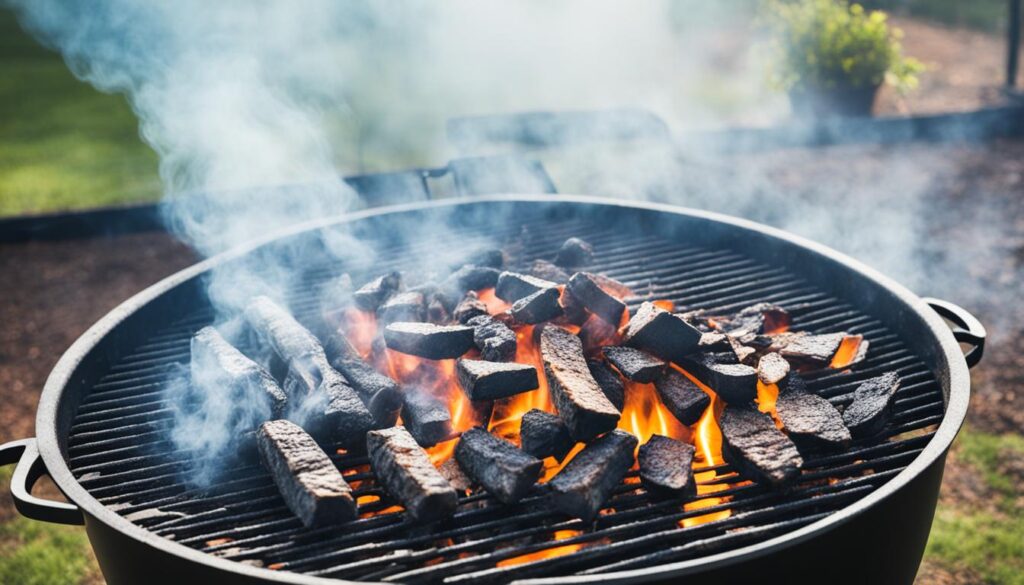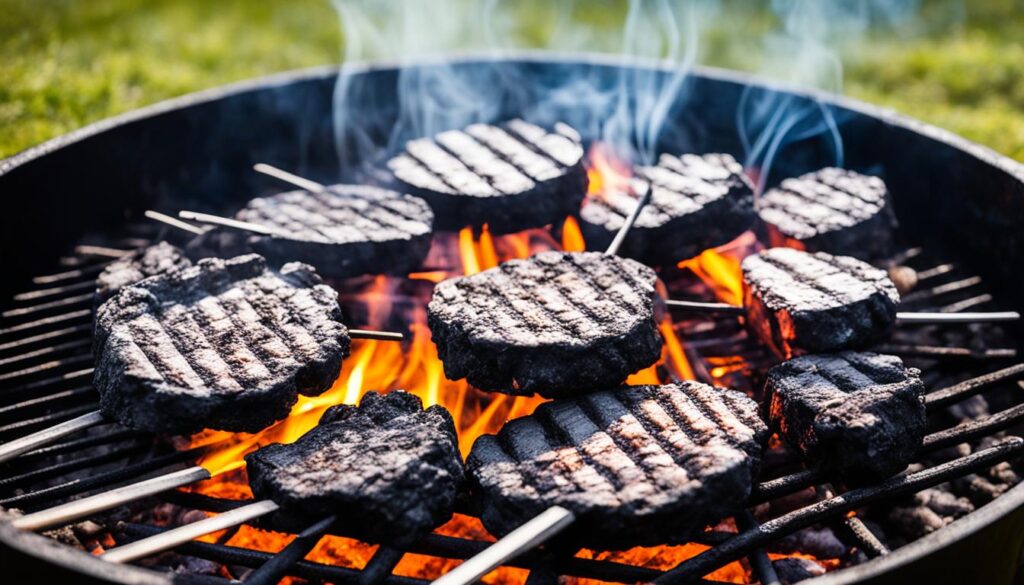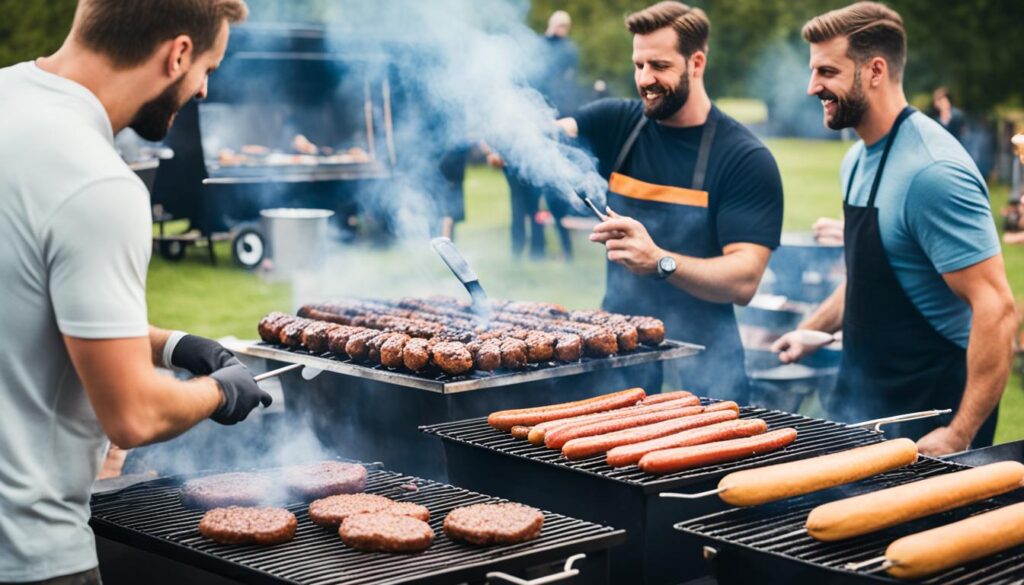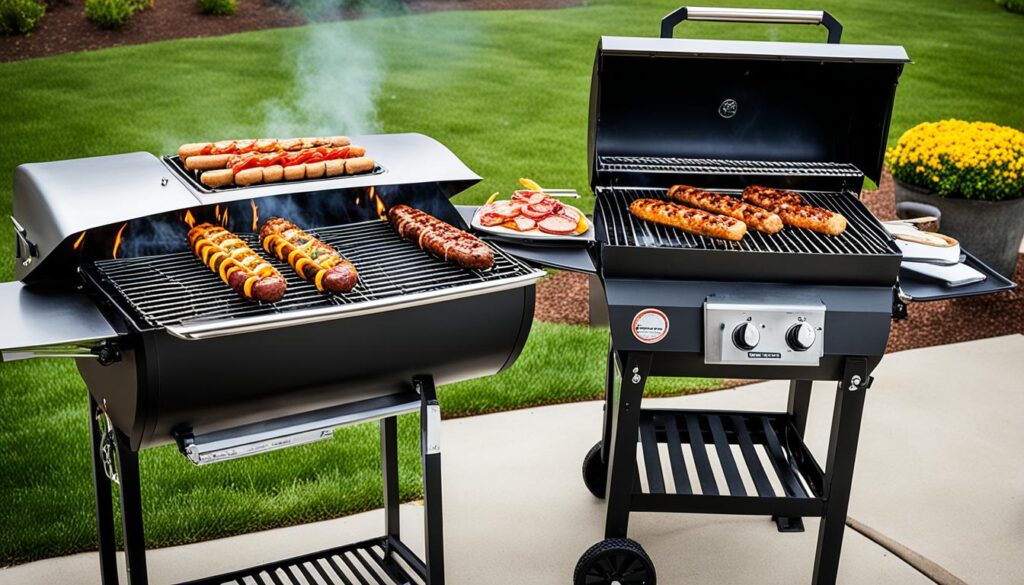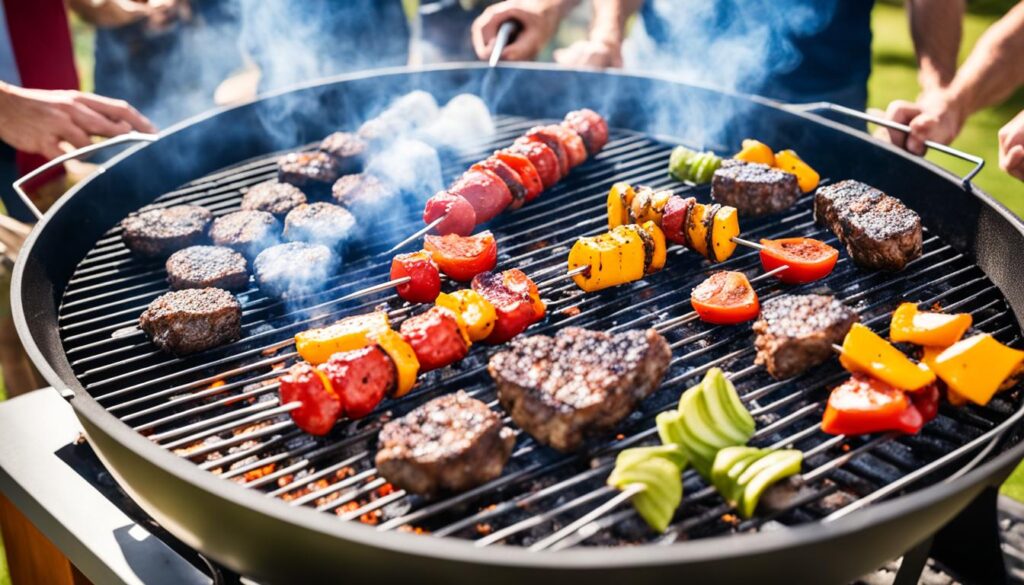Greetings! Today, I want to address a topic that many barbecue enthusiasts might be curious about: the average lifespan of a BBQ. Whether you’re a seasoned griller or just starting out, understanding how long your barbecue will last is essential for planning and budgeting. In this article, I will provide insights into the factors that affect BBQ longevity, the types of materials used in BBQ construction, the impact of high heat grilling on lifespan, tips for BBQ maintenance and longevity, common BBQ parts that deteriorate over time, the average lifespan of BBQ parts, repairing or replacing a broken BBQ, tips for repairing a BBQ, cleaning and maintenance tips, safety tips for BBQ grilling, and finally, when to decide whether to repair or replace your BBQ. So, let’s dive in and explore the fascinating world of BBQ lifespan!
Key Takeaways:
- The lifespan of a BBQ can vary depending on factors such as the quality of the grill, frequency of use, regular cleaning, and proper maintenance.
- Higher quality BBQs made with stainless steel tend to last longer, with some lasting up to 10-15 years if well-maintained.
- Factors that affect BBQ lifespan include the quality of the grill, frequency of use, regular cleaning, and proper maintenance.
- The materials used in BBQ construction, such as stainless steel and porcelain-coated steel, can impact durability and lifespan.
- High heat grilling can put more wear and tear on BBQ components, so regular cleaning and maintenance are essential to prevent deterioration.
Now that we have covered the basics, let’s explore these topics in more detail.
Factors Affecting BBQ Lifespan
When it comes to the lifespan of a BBQ, several factors come into play. The quality of the grill, the frequency of use, regular cleaning, and proper maintenance all have an impact on how long your BBQ will last.
The quality of the grill itself is a crucial factor. Higher quality grills, constructed with thicker burner walls and stainless steel, tend to have a longer lifespan. These materials are more durable and can withstand the rigors of frequent grilling.
Another factor that affects BBQ lifespan is the frequency of use. If you use your BBQ frequently, it may be subject to more wear and tear, shortening its overall lifespan. On the other hand, if you use it infrequently, it may last longer.
Regular cleaning is essential for prolonging the lifespan of your BBQ. Cooking residues and grease buildup can damage the grill over time. By cleaning your grill after each use and regularly removing any debris or grease, you can prevent corrosion and maintain the grill’s performance.
Proper maintenance is also vital. Protecting your BBQ from the elements, such as covering it when not in use, can help prevent rust and damage. Regularly inspecting the grill for any signs of wear or damage and addressing them promptly can extend its lifespan.
Overall, by investing in a high-quality grill, using it responsibly, cleaning it regularly, and maintaining it properly, you can ensure that your BBQ lasts for many enjoyable seasons of grilling.
Types of Materials Used in BBQ Construction
The choice of materials in the construction of a BBQ can have a significant impact on its durability and lifespan. Different types of stainless steel, porcelain-coated steel, cast iron, and solid stainless steel are commonly used in BBQ construction. Let’s explore these materials in more detail:
- Grade 304 Stainless Steel: Known for its corrosion resistance and durability, Grade 304 stainless steel is considered the best option for gas grills. It can withstand the outdoor elements and provide a long-lasting BBQ experience.
- Porcelain-Coated Steel: Porcelain-coated steel is a more affordable option for BBQ construction. However, it does have a shorter lifespan compared to stainless steel. The porcelain coating helps protect the steel from rust and adds a sleek, easy-to-clean finish.
- Cast Iron: Cast iron is a classic choice for grates due to its excellent heat retention and even heat distribution. While it offers good durability, it requires proper seasoning and maintenance to prevent rust and prolong its lifespan.
- Solid Stainless Steel: Solid stainless steel cooking grates are the most expensive option but also offer the longest lifespan. They are incredibly durable and resistant to corrosion, ensuring your BBQ will withstand the test of time.
It’s important to note that in addition to the materials used, the thickness of the construction materials and the quality of the porcelain coating can also influence the lifespan of various parts. Investing in a BBQ constructed with high-quality materials will not only enhance its durability but also contribute to a better grilling experience.
High Heat Grilling and Its Impact on BBQ Lifespan
When it comes to grilling, many enthusiasts enjoy the thrill of high heat cooking. Whether searing a steak or charring vegetables, high heat grilling adds flavor and creates that coveted charred exterior. However, it’s essential to understand the impact high heat can have on the lifespan of your BBQ.
High heat grilling can result in increased wear and tear on your BBQ components. The intense heat can accelerate the deterioration of various parts, especially if the grill is not regularly cleaned and maintained. This wear and tear can lead to decreased performance and ultimately shorten the lifespan of your BBQ.
One particular concern when it comes to high heat grilling is the use of high acid marinades. These marinades, commonly made with acidic ingredients like lemon juice or vinegar, can corrode the grill’s surfaces over time. The constant exposure to these acids can weaken the metal, causing it to deteriorate and potentially affect the overall longevity of your BBQ.
Another issue that arises from high heat grilling is the buildup of grease. When cooking fatty meats, grease can accumulate on the heat plates and in the grease tray. This buildup not only increases the risk of flare-ups but can also lead to potential damage to the grill. Grease buildup can obstruct the flames and affect heat distribution, resulting in uneven cooking and decreased performance.
To mitigate the impact of high heat grilling on your BBQ’s lifespan, regular cleaning and maintenance are crucial. It’s important to clean your grill after each use, ensuring that grease and food debris are removed from all parts of the grill. Additionally, deep cleaning your BBQ on a regular basis will help remove any stubborn residue and prevent the buildup of grease and other contaminants.
By taking the time to properly clean and maintain your grill, you can extend its lifespan and ensure optimal performance. Regularly inspecting your grill for any signs of corrosion, rust, or wear and tear is also essential. If you notice any damaged or deteriorated parts, it’s important to replace them promptly to prevent further damage and maintain the longevity of your BBQ.
In the next section, I will share valuable tips for BBQ maintenance and longevity, helping you keep your grill in top shape for years to come.
Tips for BBQ Maintenance and Longevity
Proper maintenance plays a crucial role in extending the lifespan of your BBQ and ensuring its optimal performance. Here are some essential tips to keep your grill in top shape:
- Cleaning the grill: After each cookout, make it a habit to brush the cooking grates to remove any residual food and grease. This will prevent buildup and keep your grill clean.
- Seasonal maintenance: With every change of the seasons, perform a deep cleaning of your grill. Scrub the grates, clean the burners and heat plates, and remove any ash or debris from the bottom of the grill.
- Winterizing the grill: Before storing your grill for the winter, take some time to prepare it for the colder months. Clean the grill thoroughly, remove any leftover propane tanks, and cover the grill with a weather-resistant cover to protect it from the elements.
- Deep cleaning: At the end of each grilling season, give your grill a thorough deep cleaning. Disassemble the grill as much as possible, clean all the parts individually, and inspect them for any signs of wear or damage. This will help maintain its longevity.
- Replacing grill parts: Instead of buying a completely new grill, consider replacing worn-out or damaged parts. Regularly check the condition of crucial components such as burners, ignition systems, and cooking grates. Replacing these parts when necessary can significantly extend the lifespan of your BBQ.
By following these BBQ maintenance tips, you can ensure that your grill remains in optimal condition, providing you with many delicious meals for years to come.
Common BBQ Parts That Deteriorate Over Time
Over time, certain parts of a BBQ can deteriorate and impact its performance. It’s important to be aware of these common issues to ensure optimal grilling experiences. Here are the parts that may require replacing:
- Burners: The burners in a BBQ can wear out over time, leading to inconsistent heat and uneven flames. If you notice cold spots or irregular flame patterns, it may indicate a deteriorating burner.
- Heat Plates: Heat plates, also known as heat shields or flavorizer bars, protect the burners and help distribute heat evenly. If they become rusted, cracked, or damaged, they can cause flare-ups and inconsistent temperature.
- Igniters: Igniters are responsible for starting the BBQ’s flame. If they fail to ignite consistently or don’t spark at all, it may be time to replace them.
- Cooking Grates: Cooking grates are subjected to high temperatures and constant use, resulting in wear and tear. When grates become rusty, chipped, or warped, they can affect the quality of your food and lead to uneven cooking.
Deteriorating BBQ parts can cause various issues, ranging from inconsistent heat and uneven flames to flare-ups and poor overall performance. Regularly inspecting your BBQ for signs of rust, damage, or wear is crucial. By replacing any broken or deteriorated parts, you can ensure consistent heat, even cooking, and enjoyable grilling experiences.
Average Lifespan of BBQ Parts
When it comes to BBQs, the lifespan of the individual parts can vary depending on factors such as quality and usage. On average, you can expect a minimum lifespan of two years for any BBQ part. However, there are higher quality pieces that can last even longer, up to 10-15 years if well-maintained.
If a part breaks down before its expected lifespan is up, it is important to consider warranty coverage. Many BBQ manufacturers offer warranty protection, and contacting the manufacturer to get the part replaced may be necessary. Taking advantage of warranty coverage can save you money and ensure the longevity of your BBQ.
Regularly replacing parts is also essential for extending the overall lifespan of your BBQ. As parts wear down or become damaged over time, replacing them with high-quality replacements can keep your BBQ functioning at its best and prevent further damage to other components.

Repairing or Replacing a Broken BBQ
When your BBQ is damaged or broken, you are faced with a decision to either repair it or replace it entirely. The choice between these options depends on various factors, including the cost of repairs, the time and effort required, and the overall cost of buying a new BBQ.
If your BBQ is of lower quality and prone to breakdowns, repairing it may not be the most cost-effective solution in the long run. Lower-quality grills often have other parts that are likely to deteriorate soon, resulting in additional repair costs. In such cases, it may be more sensible to invest in a new grill that offers better longevity and durability.
However, if your BBQ is of higher quality, repairing it can be a worthwhile investment. High-quality grills generally come with extensive warranty coverage, which can help offset the costs of repairs. By fixing the damaged parts, you can restore your BBQ to its optimal functioning and extend its lifespan for many more years of enjoyable grilling experiences.
To make an informed decision, it is essential to evaluate the costs, benefits, and practicality of repairing versus replacing your broken BBQ. Consider factors such as the extent of the damage, the availability of replacement parts, and the warranty coverage. By weighing these factors against buying a new grill, you can determine the most suitable course of action for your specific situation.
Restoration: Giving New Life to your BBQ
If you decide to repair your broken BBQ, restoration can be an exciting project that allows you to breathe new life into your grill. Restoration involves not only fixing the damaged parts but also rejuvenating and enhancing the overall appearance and functionality of your BBQ.
Depending on the extent of the damage, restoration may involve various steps, such as replacing broken components, cleaning and polishing the exterior, and upgrading certain features. By carefully restoring your BBQ, you can transform it into a beautiful and fully functional cooking appliance that will serve you well for years to come.
Tips for Repairing a BBQ
When your BBQ is not functioning properly or has deteriorated over time, repairing it can be a cost-effective solution. Many common issues can be resolved by replacing specific parts of the BBQ. Here are some tips to help you repair your BBQ:
- Identify the specific issues: Before you start repairing your BBQ, carefully assess the problems it is experiencing. Is the grill not heating evenly? Are the burners not lighting? Are the ceramic briquettes broken?
- Purchase replacement parts: Once you have identified the problematic parts, you can easily find replacement parts such as ceramic briquettes, grill grates, burners, and ignitors. Look for high-quality replacement parts that are compatible with your BBQ model.
- Installation guide: Most replacement parts come with clear installation instructions. Follow these instructions carefully to ensure proper installation. If you’re unsure about any step, consult the manufacturer’s website or customer support for assistance.
- DIY repairs: Many BBQ repairs can be done without professional assistance. With the right replacement parts and tools, you can successfully repair your BBQ. However, if the repair involves complex mechanisms or electrical components, it is recommended to seek the help of a professional.
Repairing your BBQ not only saves you money but also extends the lifespan of your beloved outdoor cooking equipment. By replacing damaged or worn-out parts, you can restore your BBQ’s performance and enjoy delicious grilled meals for years to come.

Cleaning and Maintenance Tips for BBQ
Proper cleaning and maintenance are vital for the performance and longevity of your BBQ. Here are some essential tips to keep your grill in top shape:
Cleaning Cooking Grids:
After every use, make sure to clean the cooking grids to prevent the buildup of grease and food residue. Use a grill brush to scrub off any leftover debris thoroughly.
Cleaning the Grease Catch Pan:
Periodically clean the grease catch pan to prevent grease accumulation, which can lead to flare-ups and affect the flavor of your food.
Inspecting and Cleaning Lava Rock or Ceramic Briquettes:
If your grill is equipped with lava rock or ceramic briquettes, inspect them regularly for signs of wear or clogging. Clean or replace them as needed to ensure even heat distribution.
Cleaning Vaporization or Flavor Bars:
Vaporization or flavor bars enhance the taste of grilled food, but they can accumulate grease and residue over time. Burn off any residue by igniting the grill with the bars in place, or clean them with a wire brush.
Cleaning Burners:
Burners are essential for heat distribution, so it’s crucial to keep them clean. Use a wire brush to remove any debris or buildup. If necessary, replace any damaged or worn-out burners.
Cleaning the Grill Exterior:
The exterior of your grill also requires regular cleaning. The cleaning method may vary depending on the grill’s finish. For powder-coat painted grills, use mild soap and water. For porcelain-enamel finishes, avoid abrasive cleaners that could damage the surface. Stainless steel grills can be cleaned with stainless steel cleaner or mild soap and water.
Checking LP Tanks:
LP tanks should be inspected for leaks and kept in good condition. Check the tank for any signs of damage or rust before each use. If you suspect a leak or notice any issues, consult a professional or contact the manufacturer for assistance.
By following these cleaning and maintenance tips, you can ensure that your BBQ remains in excellent condition, guaranteeing optimal performance and longevity.
Safety Tips for BBQ Grilling
Grilling on a BBQ can be a fantastic way to enjoy delicious meals outdoors. However, it’s important to prioritize safety to prevent accidents and injuries. Follow these BBQ safety tips to ensure a safe and enjoyable grilling experience:
- Grill in a well-ventilated outdoor area: It’s crucial to grill in a space with plenty of fresh air circulation. This helps dissipate any smoke or fumes that may be produced during grilling.
- Set up the grill away from flammable materials: Keep your BBQ at a safe distance from any flammable objects such as trees, shrubs, and buildings. This reduces the risk of accidental fires.
- Use long-handled utensils and flame-retardant mitts: To avoid burns, use long-handled utensils to handle and flip food on the grill. Additionally, wear flame-retardant mitts to protect your hands when adjusting grill settings or removing hot items.
- Manage flare-ups and grease fires: Flare-ups can occur when fat or grease ignites on the grill. To manage them, use a long-handled spatula to move food away from the flames. In the case of a grease fire, never use water to extinguish it, as it can escalate the fire. Instead, close the lid to starve the flames of oxygen or use a fire extinguisher specifically designed for grease fires.
- Have a fire extinguisher or bucket of sand nearby: It’s always wise to have a fire extinguisher or a bucket of sand within reach when grilling. In case of emergencies or unexpected fires, these tools can help you quickly and safely extinguish the flames.
By following these BBQ safety tips, you can minimize the risk of accidents and ensure that your grilling experience remains enjoyable and problem-free. Stay safe and happy grilling!

Repair or Replace: When to Decide
When it comes to deciding whether to repair or replace your BBQ, there are several important factors to consider. One of the key considerations is the cost comparison between repairs and purchasing a new grill. Lower-end grills, which may have a shorter lifespan and less durability, might not be worth extensive repairs.
However, if you own a higher-end grill with extensive warranty coverage and superior quality, repairing it can often be a cost-effective choice. These grills are built to last and are designed to withstand wear and tear. Choosing to repair your higher-end grill means you can continue enjoying its superior features and performance for many more years.
Another factor to consider is whether you want to upgrade your BBQ’s features. If you find that your current grill is lacking certain functionalities or technological advancements, it might be worth considering a replacement. Upgrading to a new grill will allow you to enjoy the latest features and innovations in BBQ technology, enhancing your grilling experience.
Lastly, keep in mind the overall quality and longevity of your BBQ. If your grill has been experiencing multiple breakdowns or is showing signs of significant wear and tear, it might be an indication that it’s time for a replacement. Choosing a higher-end grill with better construction materials and craftsmanship can provide you with a more durable and long-lasting grilling solution.

